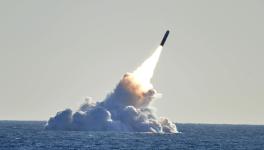The Three Wars in Ukraine and How We Might all Lose
The war in Ukraine is now part of three interlocking wars: the physical war, the information war and the economic war. If we want to know what today’s hybrid war looks like, this is it. The United States has been preparing for such a war. It is executing this war with its control over the world’s biggest digital platforms and weaponising the dollar. Russia is slowly but surely reaching its military targets in Ukraine, and talks between them may soon lead to a winding down of the hostilities, even if the United States and NATO countries are quite willing to fight Russia to the last Ukrainian. Unwinding the economic war will be much harder, as sanctions, once imposed, seem to acquire a life of their own.
At the core of the economic war is an energy war, as Russia is a big supplier of oil, natural gas and even enriched uranium to the European Union and the United States. The West, the European Union, the United States and the United Kingdom had chosen natural gas as a bridge fuel to reach a net-zero carbon emission future. With the sanctions on Russia, this path is in jeopardy. Phasing out coal might now be delayed to meet the shortfall in energy because of cuts in Russian gas imports from Russia. Worse, importing liquefied natural gas (LNG) from West Asia, North Africa and the United States as a replacement instead of piped gas will create additional methane emissions. Methane is a greenhouse gas with 80 times higher global warming potential than carbon dioxide, though methane has a shorter time-cycle of 20 years, unlike the much longer-lasting carbon dioxide time-cycle.
Methane, the major component of natural gas, exists naturally in gaseous form. For making it easy to transport in tankers, it has to be cooled to a liquid state, or LNG. It is evaporated continuously in small quantities to maintain its liquid form at minus 160 degrees Celsius during transportation. Apart from this, there are considerable energy costs in liquefying and re-gasifying natural gas and fugitive methane emissions. Therefore, switching to LNG has additional costs in terms of greenhouse gas emissions. Even if Russian piped gas can be replaced by LNG, additional methane in the atmosphere will mean the European Union's global warming targets using natural gas as a bridging fuel will take a huge hit. As the European Union is a significant contributor to global greenhouse gas emissions, we risk losing our war on global warming as an unintended consequence of the West's economic war on Russia.
A brief look at the numbers of natural gas imports will explain the significance of Russian gas to the European Union. The European Union imported 155 billion cubic metres—almost half (45%)—of its natural gas requirement from Russia. Even if LNG is available in the international market, the European Union currently does not have the re-gasification capacity or the pipelines from its ports to handle this extra volume of LNG. That is why the European Union has kept the Russian entities supplying it with gas and the banks that deal with the payments for gas supplied outside of sanctions.
According to the International Energy Agency, Russia is the second-largest exporter of crude oil globally, ranking just after Saudi Arabia. If we include other petroleum products—fuel oil, naphtha and condensates—Russia is the largest supplier in the world. In the West's attack on Russia's finances, it has been easy to use the United States' control over the dollar to freeze—in effect seize—Russia's money stored with western banks. It will be much more difficult to do without the continuous flow of Russia's piped gas to Europe and deal with the consequences of taking all other Russian energy petroleum and petroleum product supplies out of the global market. The current sanctions have already raised the price of oil to $132 per barrel from $60 last year, though it dropped marginally after the United States released strategic reserves into the market and OPEC accepted raising production. The current rise to $120-130 per barrel has to be seen in the context of oil prices being in the range of $60-65 per barrel most last year. The United States, of course, has a vested interest in raising the price of oil in the international market. Its fracking gas becomes economically viable only if the global oil prices are high.
The adverse impact of high energy prices is obvious for developing countries, most of which—including India—import their oil. The predicted rise to $200-250—more than three times last year’s prices—will be an even bigger disaster to their economies. We are likely to see a further contraction of the global economy with a combination of stagnation and inflation. India is particularly vulnerable as a big importer of petroleum and petroleum products. Its economy has been slowing down in the Modi years, accompanied by high inflation rates.
The seizing of Iran, Libya, Venezuela, Afghanistan, and now Russian foreign exchange reserves in the United States, United Kingdom, and European Union has revealed the dangers of the United States and its allies’ financial control over the world. What does it say about finance capital and imperialism in the current era that this has been done not to smaller third world players but one of the largest economies with vast foreign exchange reserves. Every country with a foreign exchange surplus now has to regard it not as their strength. Their dollar, pound or euro reserves are hostages of the West. In the same way, vassal rulers had to give their children as hostages to imperial overlords, who were supposedly their guardians.
The energy issue goes far beyond differences between countries and which country gets to dominate the world. We have a short window before we cannot reverse the worst-case global warming scenario from becoming inevitable. With the focus of the West squarely on how to subjugate Russia and then China, it is clear that a cooperative future for humanity to combat global warming is not on its agenda.
Russia is not simply a Petro-state, as the United States would have us believe. Yeltsin's kleptocratic years and its virtual subjugation forced it into greater self-sufficiency. Russia has re-emerged as a major international player. Even today, the United States buys a large number of advanced rocket engines from Russia for its satellite launches. It is on par with the West in arms and military hardware, as seen in Syria.
Russia saw NATO's expansion, the United States walking out of the Anti-Ballistic Missile Treaty, the Open Skies Agreement, the Intermediate-Range Ballistic Missile Treaty, its positioning missiles in Romania and Poland, as the implementation of a winnable nuclear war strategy. The war over Ukraine was foretold by George Kennan, Henry Kissinger and John Mearsheimer. They all predicted the inevitability of a clash between NATO and Russia if the United States pursued an eastward expansion policy for NATO. None of them holds progressive or anti-imperialist views, while two—Kennan and Kissinger—were arch-imperialists instrumental in building the current United States empire.
The only block of countries that have lost in the Ukraine war—apart from Ukraine itself— is the European Union, particularly Germany and France. They will be far more dependent on the United States, as they have to import LNG from it and West Asia. By imposing financial sanctions and forgoing Russian gas imports built during Willy Brandt’s Ostpolitik era, Germany has given up its independent position in Europe and world affairs.
The Ukraine war is a watershed moment for the world. Every country will have to address the dollar hegemony that the United States has asserted on Ukraine over Russia: surrender, or else. The world faces an existential challenge, to build a more international financial architecture or surrender to dollar hegemony. How countries meet this challenge will decide the fate of the 21st century.
Get the latest reports & analysis with people's perspective on Protests, movements & deep analytical videos, discussions of the current affairs in your Telegram app. Subscribe to NewsClick's Telegram channel & get Real-Time updates on stories, as they get published on our website.
























